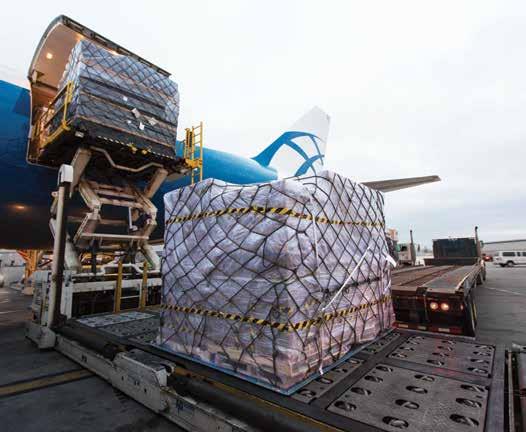
5 minute read
Madhav Thapar, Vice President - South Asia
Mad hav Thapar
Logistics is one of the most adaptable and agile industries and surely it will continue to play a critical role through the global recovery, believes
Advertisement
Madhav Thapar , Vice Pres ident- Sout h
As ia and Managing
Director - India,
C H Robinso n. In a riveting conversation, the logistics sector expert informs Ajeet Kumar, India’s scale and geographic positioning which offers tremendous opportunity to the country to become an international hub for air, sea and multimodal movement of goods. And, if appropriately harnessed, India can achieve the goals sooner.
India must be careful not to nearly 200,000 customers overregulate the logistics sector, a nd cont rac t c a r r iers worldwide. Backed by con tingency plans, our global especially in terms of pricing team of experts is working closely with customers on production planning and forecasting to ensure they are prepared with strategy and execu tion support and, if necessary, appropriP ost-lockdown, how long would you estimate it would take for our industry to get back to business as usual? What will be the growth drivers? reduce due to recessionary trends. Therefore, we will likely see an overall decrease in volume and a modal shift to ocean freight. Businesses can take ad vantage of cost savings until the panate mitigation plans. We will likely see an overall decrease in As lockdowns start to ease, China and demic eases and world economies revert volume and a modal rest of Asia show an immediate surge in to normal growth. shift to ocean freight. cargo movements. This surge is mostly witnessed in case of air freight, as reopened businesses quickly fulfil stock inventory and non-essential freight or How has your organisation been providing customer experience during the lockdown? Businesses can take advantage of cost savings until the ders, which were previously put on hold Our scale, technology, and single multipandemic eases and due to the lockdown. However, as the modal global transportation manageworld economies revert initial rush eases, it’s likely that con ment system - Navisphere has enabled to normal growth. sumption and demand will significantly us to continue support our network of
Demand and tight capacity escalate prices in the air market. As such at a time, we have been able to leverage the fast boat – expedited ocean services – option for customers. Our expedited FCL and LCL service offers customers a quick shipping method with significant cost savings compared to air freight.
The consumer sentiment being low now and considering economic downturn across the globe, what will be the scenario of logistics services required in the next couple of years? As consumer sentiments and shopping patterns change, we’ll likely see a shift in the types of commodities shipped in higher volumes. For example, as busi nesses and states plan to re-open, importing personal protective equipment (PPE) remains vital. Logistics is one of the most adaptable and agile industries, and I am sure it will continue to play a critical role through the global recovery.
Experts say the industry will also see a lot of automation with less staff and more of machines doing the job. Is this a curious case of commercial consideration or a business continuity necessity? Automation is an inevitable part of the future and not necessarily just linked to COVID-19, though the pandemic has undoubtedly accelerated some initia tives. However, automation, in the long run, means more efficiencies, more vol umes and more job opportunities due to faster economic development.
Do you see some modal shifts in the way the industry had been working earlier? Modal shifts are usually situational, and demand related. It will depend on how long the pandemic lasts and the pace of recovery.
As the need for importing PPEs rose, we worked with many of our customers to introduce metered freight options. For instance, as capacity was tight and pric es skyrocketed in the air market, we leveraged our scale and expedited ocean service to shift PPEs, which provided cost savings for our customers.
India’s logistics ecosystem has long been impacted by archaic regulations. Privatising the logistics infrastructure could support India’s dream of becoming a manufacturing hub.
Can we expect more automation coming into the entire supply chain for the handling of cargo in a multimodal network? Multimodal visibility and automation are important parts of managing a supply chain. Our multimodal transportation management system, Navisphere, offers comprehensive visibility and tailored, market-leading solutions across modes.
However, as we continue to invest in technology, our people remain a top pri ority. Our local expertise combined with smarter solutions drive our customers’ supply chains.
What are the areas logistics professionals globally need to keep an eye

on and put up a unified front? The countries who have recovered fastest, and even to some extent grown postcrisis, are the ones where the logistics sectors are agile, automated and open to free-market competition.
India must be careful not to over regulate the sector, especially in terms of pricing. The competition will find its optimum levels and bring pricing effi ciencies in due time.
As India is trying to be a manufacturing hub, how can the logistics ecosystem players gear up in supporting India’s dream? India’s logistics ecosystem has long been impacted by archaic regulations. How ever, India’s scale and geographic positioning offers tremendous opportunity for the country to become an international hub for air, sea and multimodal move ment of goods. Privatising the logistics infrastructure could support India’s dream of becoming a manufacturing hub.
In the later phase of the lockdown, what is the ground reality? Has seamless transport systems been restored? Recovery is slow due to the fragmented policies and interpretations between the Centre and states. Our team at C H Rob inson is working hard to continue to provide uninterrupted services, al though quick changes arise and uncertainty remains in the market.










